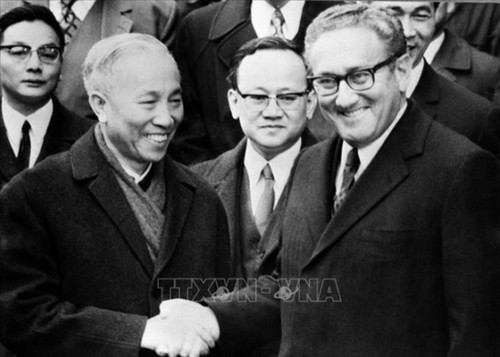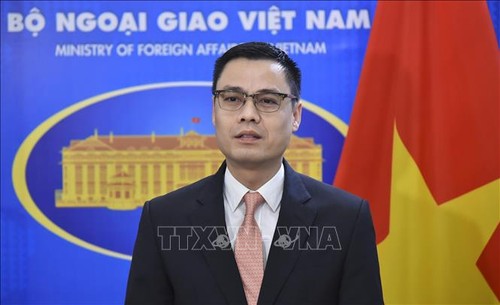 Special Advisor Le Duc Tho and Dr. Henry Kissinger, the US President’s Assistant for National Security Affairs, congratulate each other after the initial signing of the Paris agreement. (Photo: VNA) Special Advisor Le Duc Tho and Dr. Henry Kissinger, the US President’s Assistant for National Security Affairs, congratulate each other after the initial signing of the Paris agreement. (Photo: VNA)
|
In April 1968, when he was Deputy Secretary of the central office of the Party in southern Vietnam, Mr. Tho was urgently recalled by President Ho Chi Minh to Hanoi to undertake the mission as a "Special Advisor" to the delegation of the Government of the Democratic Republic of Vietnam to directly negotiate with the representative of the US on ending the war and restoring peace in Vietnam.
At the Paris Conference, Mr. Tho made important contributions to raising awareness among the international community of the nature of the unjust war of the US in Vietnam via activities during public and secret negotiations and press conferences.
In all secret negotiations with the US President’s Assistant for National Security Affairs, Henry Kissinger, Mr. Tho always demonstrated the goodwill and wish of the Vietnamese people to end the war and restore peace in Vietnam and at the same time affirmed Vietnam’s stance in resolutely struggling for national independence and reunification.
According to former Foreign Minister Nguyen Dy Nien, during the five-year negotiations in Paris, Mr. Tho was considered a “general on the frontier” who was creative and always took the initiative, forcing the opponent to get involved in the negotiations following his lead.
 Deputy Foreign Minister Dang Hoang Giang (Photo: VNA) Deputy Foreign Minister Dang Hoang Giang (Photo: VNA) |
Deputy Foreign Minister Dang Hoang Giang said that at the negotiating table, Mr. Tho always earned the opponent’s respect for having the wit and intellect of an experienced diplomat.
During the negotiations, Vietnam was a small country with almost no experience in diplomacy compared to the US, a large and powerful country with military and diplomatic experience,” said Giang.
He added, “Kissinger was an ‘eminent’ figure in the diplomatic sector of the US and the world. But Kissinger always let himself be convinced by Mr. Tho’s incisive arguments. I think Mr. Tho really proved his bravery, talent, and wisdom.”
During the tense battles of wits at the Paris Conference, the US always found excuses to delay the signing of the Paris Agreement by making unacceptable demands on the Democratic Republic of Vietnam and the Republic of South Vietnam.
When Secretary of State Kissinger repeatedly made unreasonable demands, implicitly threatened to stop negotiations, and resume bombing, Le Duc Tho replied: "We fought with you for years and have been negotiating for five years. Now as you are ready, we are here to address the issue. You can't use threats against us."
If at the negotiating table, Mr. Tho always proved his bravery, wisdom, steadfast in principle but flexibility in strategy, at secret meetings with Kissinger, Mr. Tho always showed the will to attack, readiness to argue to the end of an issue, a calm attitude, flexible improvisation, but very tough when needed.
Associate Professor Bui Dinh Phong of the Ho Chi Minh National Academy of Politics, said, “The most important thing during the negotiation process was to show wisdom and bravery at that Mr. Tho thoroughly understood the enemy.”
“As State Secretary Kissinger said, Mr. Tho could read the opponent’s mind. Therefore, Mr. Tho's bravery was to actively attack the enemy by combining both principled issues and flexibility in diplomatic struggle,” said Phong.
The Paris Agreement was the victory of military, political and diplomatic struggles, to which Mr. Tho made outstanding contributions. This was the longest negotiation in modern diplomatic history, creating great resonance amongst the public and the world.
After the Paris Peace Accords were signed, Mr. Tho’s image appeared in newspapers in the US and Western countries, with praise for his negotiation skills.